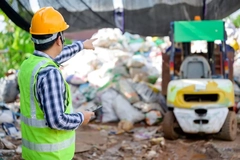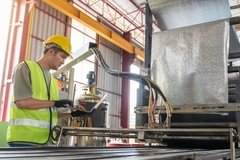“EPR essential”: PackagingInsights previews Ellen MacArthur Foundation and PREVENT Waste Alliance’s WCEF2021 side event

17 Sep 2021 --- Extended Producer Responsibility (EPR) schemes for packaging are widely regarded as crucial to combating increasing levels of waste and pollution.
EPR is based on the “polluter-pays” principle. These schemes require producers introducing packaging to the market to provide funding dedicated to its collection and processing after use.
The Ellen MacArthur Foundation and PREVENT Waste Alliance are hosting a live panel discussion on EPR mechanisms and their benefits on September 21, 11-12:00 CEST. The EPR+: Mandatory and voluntary mechanisms for financing the circular economy for plastics and packaging panel debate will be moderated by PackagingInsights.
The panel will build on the Ellen MacArthur Foundation’s statement and position paper from June, the EPR Toolbox developed by the PREVENT Waste Alliance and the experiences of the project “Rethinking Plastics” in Vietnam.
The WCEF side event will also explore how industry can address EPR implementation uncertainties and the role of complementary initiatives such as plastic credits.
The panel discussion will take place as a side event of the World Circular Economic Forum 2021. You can register here.
Finding funding
The Ellen MacArthur Foundation emphasizes EPR is “the only proven and likely pathway” to provide the required funding.
“Packaging that can’t be eliminated or reused must be collected, sorted and recycled. In almost all cases, the costs of these processes are higher than the revenues generated,” Ambrogio Miserocchi, senior policy officer at the Ellen MacArthur Foundation, tells PackagingInsights.
“To bridge the funding gap, we need ongoing, dedicated and sufficient funding and EPR is the only proven way to provide this. With more than 100 businesses calling for EPR, it is now up to governments around the world to make it happen,” Miserocchi maintains.
EPR is based on the “polluter-pays” principle, holding manufacturers accountable for post-consumer packaging waste.Without such policies, packaging collection and recycling is “unlikely to be meaningfully scaled,” the organization continues, warning tens of millions of metric tons of packaging will continue to end up in the environment every year.
“The most crucial EPR aspect is a quick shift from ‘producers’ to a system where all ‘stakeholders’ are to be made responsible,” co-panelist Fausto Tazzi, CEO of La Vie – Nestlé Waters Vietnam and vice-chairman of PRO Vietnam, tells PackagingInsights.
Tazzi further advocates for a mindset shift from “plastic is bad” to “improper disposal of resources is bad.”
“Blaming ‘plastic’ and ‘producers’ is a populistic shortcut that is distracting us from the real root cause, that is the improper disposal and management of waste in current society,” he flags.
Previous EPR success
In a previous interview, the Ellen MacArthur Foundation explained why voluntary agreements are “not enough” to support a circular economy and prevent continuous plastic pollution.
“Much of this work [to eliminate plastic in the environment] has been driven by voluntary commitments, targets and initiatives,” co-panelist Roan Snyman, sustainability manager for South Africa-based Pick n Pay, tells PackagingInsights.
“The target companies are working toward are ambitious in scope, and in my view, will be difficult to achieve without some form of EPR.”
EPR has found favor in other parts of the world. For example, the UK’s EPR legislation will come into force in 2023.
Meanwhile, nine US states coordinated on EPR legislation to hold manufacturers accountable for their plastic waste in February, with Maine being the first US state to pass the bill in July.
Snyman adds he is keen on comparing South Africa’s EPR experiences with those made in Vietnam. Notably, his co-panelists Tazzi and Dr. Fanny Quertamp, national senior advisor Vietnam of Expertise France, will share what the implementation process looks like in emerging economies in the Southeast Asian country.
Just a few days away
The session will formally take off with opening remarks by Christina Laun, head of the environmental policy, urban development, mobility, circular economy, marine conservation division for the German Federal Ministry for Economic Cooperation and Development.
“EPR is a critical stepping stone for a functioning circular economy worldwide. We are glad to see stakeholders taking up the endeavor of establishing EPR. The EPR Toolbox by the PREVENT Waste Alliance is there to support them,” Laun comments.
Be sure to attend to have your questions answered directly by the panel in a live Q&A session after the discussion.
You can register your attendance at next week’s EPR+: Mandatory and voluntary mechanisms for financing the circular economy for plastics and packaging discussion here.
By Anni Schleicher










